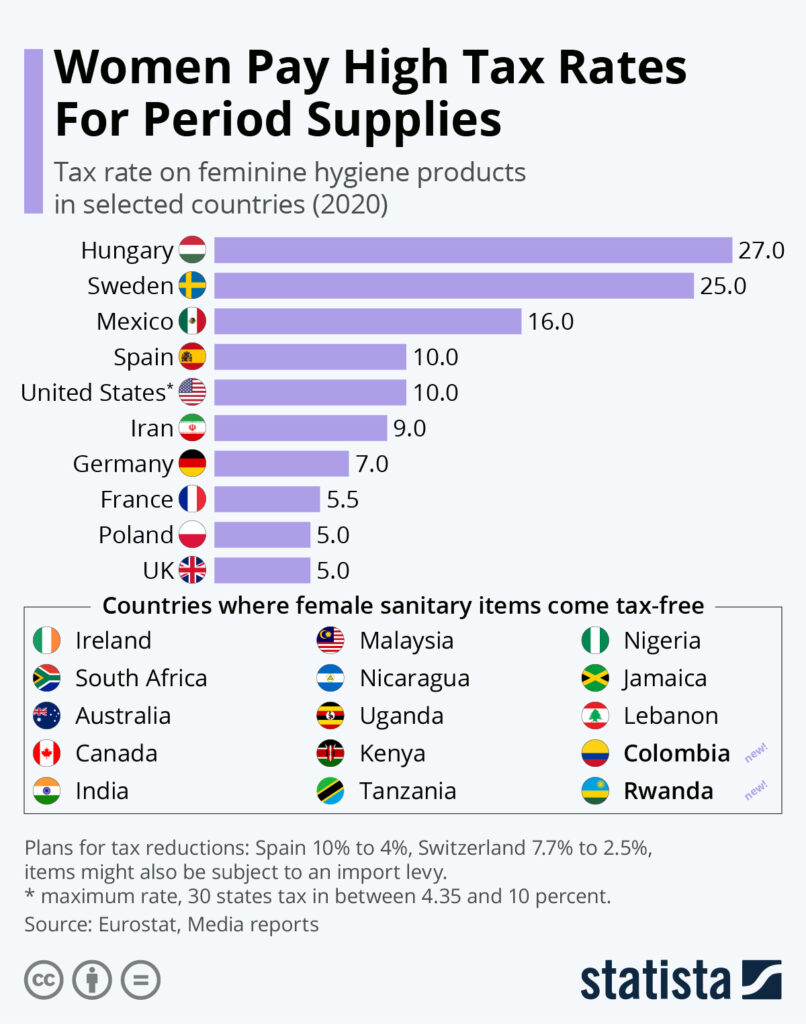By Nefeli Kanellou,
Given the recent abolishment of the Value Added Tax (VAT) on menstrual products in the UK, the debate has once again been sparkled concerning the tampon tax and the access that women have to menstrual products around the world, as well as the consequences that period poverty has on numerous young women and girls.
But what is the tampon tax exactly?
By tampon tax we are referring to the VAT imposed on menstrual products such as sanitary pads and tampons. The rate of taxation on products depends on whether they are characterized as luxury or as essential. In the vast majority of countries worldwide, menstrual products are labelled as luxury items and are therefore weighed down by a high value added tax, a stipulation that affects the less fortunate populations, even in the so-called developed states.
To be more precise, in Europe, until the abolishment of the tax in the UK in 2021, only Ireland imposed zero tax on menstrual products. The majority of the countries have a tax between 3% and 15% and the rest of the countries impose taxes as high as 25 or 27%. High taxation can translate to almost 100 euros per month for a household with 3 women or more, which may not seem that significant, but for the less fortunate who struggle to even put bread on the table, this dilemma becomes all the more prominent. Which is more essential: food or hygiene?

Such a dilemma should not exist in the first place. Hygiene is not a privilege or a luxury, but a human necessity and it should be treated as such by the lawmakers, economists and society in general.
The economic aspect though, is not the only consequence of “period poverty”. Lack of proper hygiene can be linked to serious diseases such as cervical cancer and hepatitis B. Furthermore, according to surveys conducted by UNICEF and UNESCO in many developing countries, periods are a primary reason for girls to drop out of school completely. Lacking access to menstrual products they are forced to stay at home and subsequently miss school 3 to 5 days every month leading them to decide to quit altogether. Surveys in the US and the UK have shown that around 20% of girls have missed 1 school day due to their menstrual cycle. The majority of them also stated that they feel uncomfortable to partake in any social situation while they are menstruating and they also admitted that they feel ashamed to discuss it even with their friends.
Period poverty is not just about the money. The menstrual cycle, a natural, biological process has been and still is a taboo. Lack of education and proper information on the subject leads thousands of women to feel ashamed of themselves and thousands of boys to have zero knowledge of the subject, thus making fun of girls or not knowing how to react.

Scotland is the first country to lead the way out of this vicious cycle of gender inequality and double standards by offering free menstrual products in public spaces including schools and universities. We can only hope that more countries will follow Scotland’s example, but until then there are other things we can do.
Make education about the menstrual cycle mandatory either through biology class or by mandatory seminars in schools. Establish safe places in all educational facilities and local community centres so that girls and women who experience period poverty or lack education on the matter will be able to voice their need and be educated properly. Lastly, women and human rights associations as well as NGOs and other parties interested must apply pressure on lawmakers in order to lower the taxation rate by labeling menstrual products essential rather than a luxury.
Bleeding is not a luxury. It is the inevitable course of biology.
References
- ‘Tampon tax’ abolished on menstrual products in UK – CNN
- Chart: Women Pay High Tax Rates for Period Supplies | Statista
- Many Lack Access to Pads and Tampons. What Are Lawmakers Doing About It? – The New York Times (nytimes.com)




